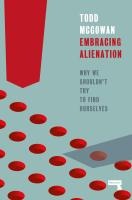The left views alienation as something to be resisted or overcome, but could it actually form the basis of our emancipation?
In Embracing Alienation, Todd McGowan offers a completely different take on alienation, claiming that the effort to overcome it is not a radical response to the current state of things but a failure to see the constitutive power of alienation for all of us. Instead of trying to overcome alienation and accede to an unalienated existence, it argues, we should instead redeem alienation as an existential and political program.
Engaging with Shakespeare's great tragedies, contemporary films such as Don't Worry Darling, and even what occurs on a public bus, as well as thinkers such as Descartes, Hegel, and Marx, McGowan provides a concrete elaboration of how alienation frees people from their situation. Relying on the tradition of dialectical thought and psychoanalytic theory, Embracing Alienation reveals a new way of conceiving how we measure progress - or even if progress should be the aim at all.

